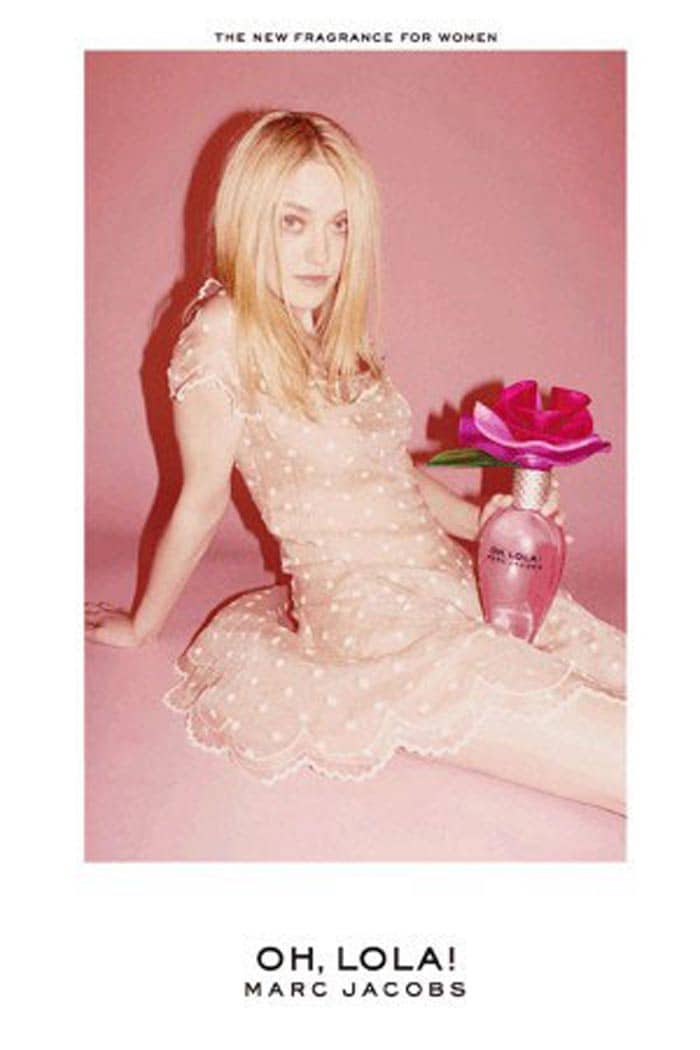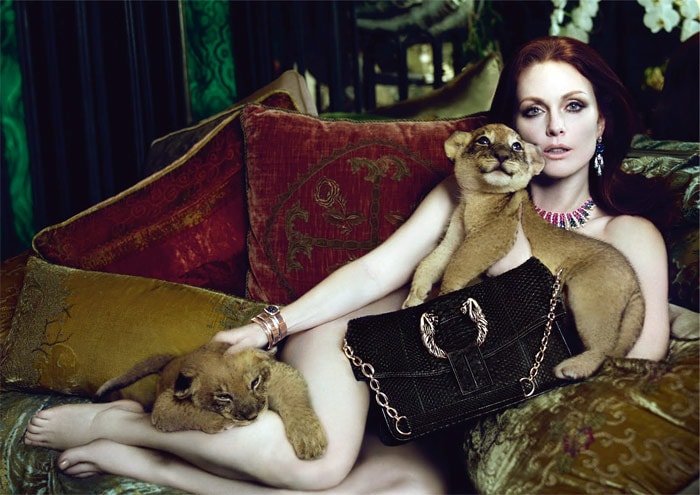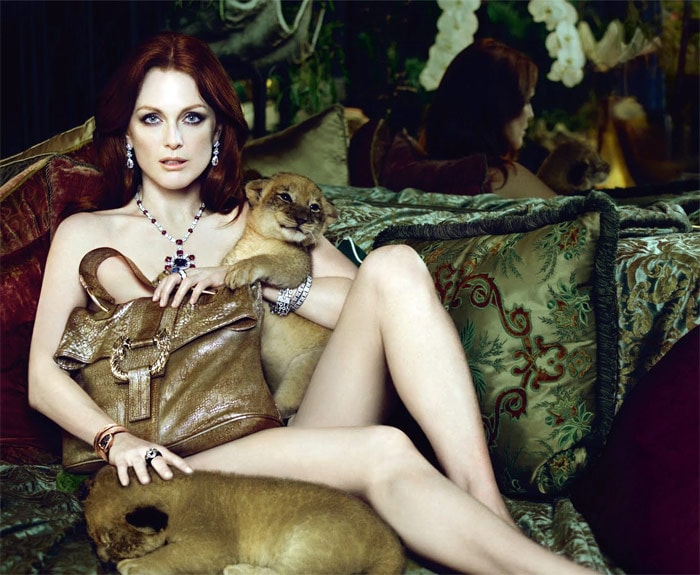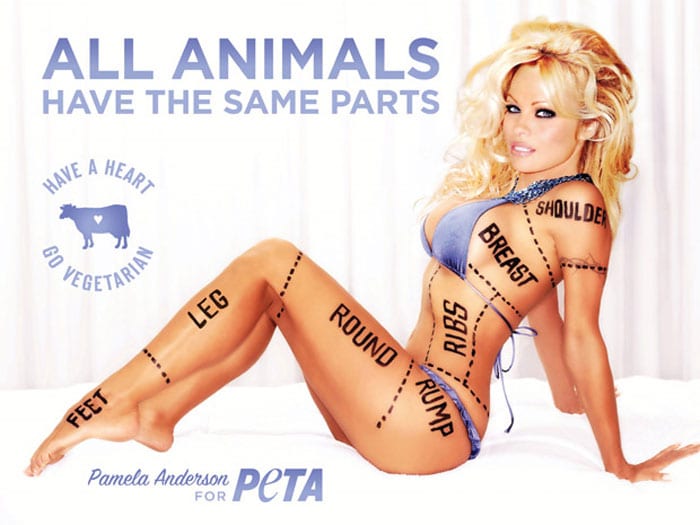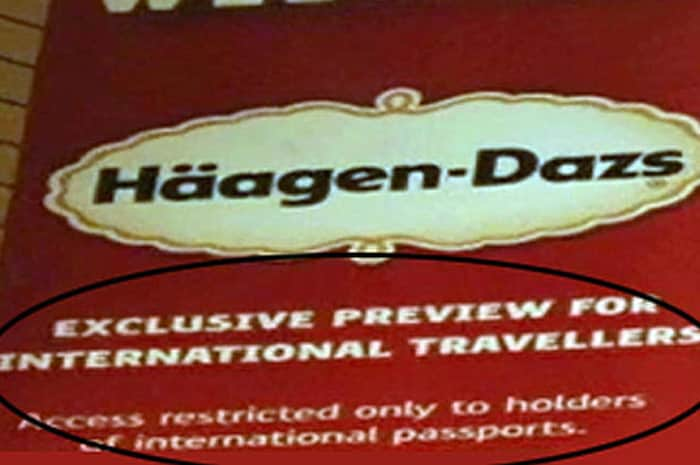Provocative Dakota Fanning perfume ad banned
Britain's Advertising Standards Authority (ASA) has banned a magazine advertisement for fashion designer Marc Jacobs' "Oh, Lola!" fragrance featuring teenage actress Dakota Fanning because it "could be seen to sexualize a child. Dakota Fanning has starred alongside some of Hollywood's biggest names, including Tom Cruise, in War of the Worlds and Denzel Washington in Man on Fire.
-
Britain's Advertising Standards Authority (ASA) has banned a magazine advertisement for fashion designer Marc Jacobs' "Oh, Lola!" fragrance featuring teenage actress Dakota Fanning because it "could be seen to sexualize a child.
Dakota Fanning has starred alongside some of Hollywood's biggest names, including Tom Cruise, in War of the Worlds and Denzel Washington in Man on Fire.
"We understood the model was 17 years-old but we considered she looked under the age of 16," the ASA said in a ruling published on its website on Wednesday. "We considered that the length of her dress, her leg and position of the perfume bottle drew attention to her sexuality."
"We therefore concluded that the ad was irresponsible and was likely to cause serious offense," it added.
The fragrance is produced and distributed by Coty UK.
Here's a look at some other ads that have been banned in the past. -
A billboard featuring Hollywood actress Julianne Moore posing naked for a fashion campaign has been banned by officials in Venice, Italy after it was deemed "inappropriate".
The Far From Heaven star stripped off for a recent shoot for Bvlgari handbags and plans were in place to erect a promotional poster in the city's famous St Mark's Square but Venice's recently elected mayor, Giorgio Orsoni, deemed the picture - which shows Moore posing with only a handbag protecting her modesty - too risqué, reports telegraph.co.uk. (Text: IANS) -
This is of course not the first time that an ad has grabbed attention for all the wrong reasons. In India too there have been a few controversial ads. We take a look back at the ads that were deemed unfit for public consumption.
The most notorious ad that still remains embedded in the consciousness of the ad-aware Indian is that of a nude Milind Soman and Madhu Sapre along with a python for company. -
The Tuff shoes print ads, featuring Milind Soman and by then former girlfriend Madhu Sapre, shocked India in the 90s. A case was filed against the models and others connected with the ad for posing nude. Another case was filed under the Wildlife Protection Act against the advertising agency for illegal use of the python. The case lasted for 14 years, after which the courts acquitted the accused.
-
The Kamasutra condom ads broke away from traditional advertising in this category with a bold and controversial approach. The ads, featuring Pooja Bedi and Marc Robinson became an instant hit. But the sensual images had the so-called moral brigade up in arms. Finally, the campaign was restricted to print.
-
Lux Cozy was also in the news in July 2007 when the I& B Ministry had issued orders banning its ad along with the much discussed Amul Macho Yeh to bada twaing hain ad. A few months earlier, in April 2007, orders were issued against the broadcasting of Gen-X undergarments.
-
Back in 1998, when Bipasha Basu was still a model and Dino Morea used to be her boyfriend, the two got cozy for an ad for Swiss underwear brand Calida. The image of Dino tugging Bipasha's panty with his teeth was too hot to handle for the then Minister of State for Cultural Affairs, Anil Deshmukh. The caption accompanying the saucy pictures read, "And you thought your appetite for indulgence could only be whetted by Swiss chocolates.
-
Recently, an animal rights poster showing Baywatch actress Pamela Anderson in a bikini with her body parts marked as pieces of meat was banned by authorities in Montreal. The ad for People for the Ethical Treatment of Animals (PETA) says: "All animals have the same parts. Have a heart. Go vegetarian."
The Montreal Film and TV Commission has refused permission to PETA to stage the poster unveiling event in the city's busy Place Jacques-Cartier. The Canadian-born Anderson, an ardent supporter of animal rights, who is in Montreal to unveil the poster, said the behaviour of city authorities was "puritanical". PETA has now decided to hold the poster launch function in a restaurant which needs no permit from the authorities. -
Earlier, a commercial featuring Pamela Anderson was also banned from television in Australia. The Baywatch star appeared in a promo for internet company Crazy Domains that showed her as a smart businesswoman who strips off to reveal a gold bikini and has milk poured over her by male colleagues.
-
Besides underwear, the other product that on the crosshairs of regulators is condoms. For a copywriter, it is quite challenging to churn out subtle ads for male contraceptives, when the nature of the product itself is explicit. The Pyar Hua Iqurar Hua ad for Nirodh condoms is only an exception.
The airing of DKT's XXX Flavoured Dotted Condoms ads during the ICC Champions Trophy in 2007 had ruffled the feathers of both the Advertising Standards Council of India and the Censor Board. -
In the ad a man takes a sip of his drink and looks at an attractive woman on the other side of the room, and her neckline gets lower and diminishes with every sip.
As he sips for the kill, he finds his shirt open. The woman is also playing the same game. The tagline says, Kucch Bhi Ho Sakta Hai (Anything is possible). The TVC was subsequently taken off air. -
The Programme Code prescribed under the Cable Television Networks (Regulation) Act, 1995, prohibits "carriage of programmes in cable service, which offend good taste or decency; contain anything vulgar/obscene and are not suitable for unrestricted public exhibition."
-
The Advertising Standards Council of India (ASCI), a self-regulatory voluntary organisation of the advertising industry, also has a code in place that asks advertisers "To ensure that advertisements are not offensive to generally accepted standards of public decency. Advertisements should contain nothing indecent, vulgar or repulsive which is likely, in the light of generally prevailing standards of decency and propriety, to cause grave or widespread offence."
-
In more liberal societies, advertisers have it a little easier, but glancing through the history of Indian advertising it is obvious that Indian advertisers do not shy away from adding some oomph to their copies.
Though government orders can put such "offending" ads off-air, they remain a big hit on the Internet. And banning them only adds to their aura on the relatively unregulated Wild Wild Web. -
No publicity is bad publicity? Not quite. Just ask ice cream major Haagen Dazs that made its entry into India on the wrong foot with an ad that threatened to keep Indians out! While the ad, prominently displayed at a South Delhi mall, just ahead of the US brand's first outlet in the country was meant to tell Indians that they can get a taste of the international best right here in India, the tagline "Access restricted only to holders of international passports" had people up in arms. Although the company has been quick to apologise for its thoughtless campaign, the controversy is just refusing to melt away.
-
In 2004, singer Christina Aguilera ran afoul of women's groups that took strong exception to her controversial campaign for American shoe company Skechers. The "Naughty and Nice" campaign, portrayed the pop star pushing the envelope as a sexy pin-up style teacher, nurse and policewoman alongside herself as an equally provocative school girl, injured patient and street criminal.
-
With the American Family Association (AFA) and the Centre for Nursing Advocacy (CNA) accusing the company of promoting gender stereotypes, Skechers had to withdraw the ads from the US market. The AFA claimed the ads made "a mockery of professional women and choose to portray them as sex objects, which undermines their value in the workplace."
-
According to the original Skechers press release "The 'Naughty and Nice' campaign's dual images allow Skechers to feature twice as many styles, giving international consumers a truer representation of Skechers' women's offering." Alas! the campaign proved too hot to handle!
-
'The Last Supper' ad by Girbaud Fashion House was banned by a tribunal in Paris "because it offended Roman Catholics". But attorneys representing Girbaud defended the controversial campaign: "The work is a photograph based on a painting, not the Bible. There is nothing in it that is offensive to the Catholic religion." (Times)
-
The producers of Captivity, a thriller starring Elisha Cuthbert and Daniel Gilles, ran into trouble with the Motion Picture Association of America that saw the film's promotional material make uncomfortable references to graphic torture. They threatened to withhold the film's rating unless this was changed.
-
Supermodel Kate Moss apparently 'faked it' for Rimmel Magnif's eyes Mascara ads. With the company unable to prove that Moss had not worn fake eyelashes to promote an eyelash extending product, Britain's Broadcast Advertising Clearance Cente asked Rimmel to discontinue the ads.
-
Channel 4's advertising for its series Six Feet Under, featuring a range of morbid beauty products, stirred up a hornet's nest. While the first ad showed a man's naked shoulders and head with a bottle in the foreground labelled 'In Eternum + embalming fluid' and the words 'skin to die for' next to it, in the second a woman was pictured with her lips open. The image contained a jar labelled 'In Eternum + wound filler' and the words 'beauty to die for'. Channel 4 argued the ads were 'obviously a spoof', given the 'fantastical notion' of the products featured. The British ASA however found the campaign 'misleading'.
-
Few missed the lesbian overtones of FCUK's 'Fashion vs Style' campaign that showed two women beating each other up before being soaked with water and then embracing. The violence and sexual imagery provoked howls of outrage from offended television viewers. The ad was ostensibly meant to represent a quote from French designer Yves Saint Laurent who once said: "Fashion fades, style is eternal." The battle pits fashion against style; the reconciliatory kiss suggests that neither wins. The campaign however turned into a losing proposition for FCUK.
-
The British Advertising Standard Authority (ASA) asked a Harvey Nichols ad to be withdrawn after it received objections that it encouraged dangerous driving. Although Harvey Nichols argued that scenario was not real and said it was intended to be humorous, the Authority wasn't amused. It decided that the campaign was 'likely to offend those who had been involved in car accidents or who knew people who had been injured or killed in car accidents'.
-
TG4's advertisement promoting the show Paisean Faisean was panned by outraged viewers in Ireland who said it was degradring to women in general, and teachers in particular. The poster showed a teacher dressed a very short skirt and fishnet stockings and carried a tag line 'Girls dressed by boys'. The clarification given by the adverisers who said Paisean Faisean was a light-hearted entertainment show, failed to impress the Advertising Standards Authority of Ireland.
-
A highly suggestive ad by fashion designers Dolce and Gabbana was banned from Italian publications. The advertisement showing a woman pinned to the ground by the wrists by a bare-chested man, with other men in the background looking on. The Advertising Self-Discipline Institute (IAP) said the ad "offended the dignity of the woman, in the sense that the feminine figure is shown in a degrading manner. The woman has an alienated expression, with an absent look".
-
The 'Killer Heels' ad by the Newspaper Marketing Agency (NMA), a group set up by British newspapers to make them more attractive to advertisers, was found to have 'trivialized and stylized violence'. While the NMA said the campaign was targeted at fashion brands that had largely stopped advertising in newspapers, and 'did not exceed the standards acceptable in the fashion industry', the Advertising Standards Authority of Britain was having none of it. The ad was banned and the advertisers warned not to repeat the approach.
-
A poster advertisement meant for promoting Tiger Beer in Ireland, sparked controversy with viewers alleging there was no apparent connection between the violent image and the product being advertised. Holding a razor to anyone's throat was also considered unacceptable in a public advertisement. The ASA ordered the ad to be withdrawn.
-
A £1m campaign by Barnardo's, the children's charity, had to be axed after the images were found to be too shocking. In its ruling the Advertising Standards Authority (ASA) of Britain acknowledged seriousness of the message that Barnardo's was trying to convey, but said that the ads, including one that showed a newborn with a meths bottle in her mouth to draw the link between poverty and alcoholism, had gone just too far to attract attention.
-
A sexy ad for national beer brand Devassa featuring Paris Hilton bending over in provocative poses is reportedly raising the ire of Brazilian authorities, who want to see it pulled off the air. The spot, which shows the US socialite and celebrity strutting around a Rio apartment in a tiny black dress while a peeping-tom neighbour snaps pictures, is being investigated by Conar, the self-regulator for Brazil's ad industry, and the government's women's rights special secretariat. "The problem with the ad isn't a lack of clothing, but its sensual nature," Eduardo Correia, a Conar spokesman, told media. (Agencies)
-
The World Wildlife Fund (WWF) claimed it had never released this ad with the slogan 'the tsunami killed 100 times more people than 9/11. The planet is brutally powerful. Respect it. Preserve it' in Brazil. It was apparently the work of South American firm called DDB that was trying to impress WWF with its creative genius. Unfortunately in this case, the move backfired and WWF was quick to distance itself from a campaign that it described as 'offensive and tasteless'.
-
Sex may sell but clearly BMW wasn't selling its Premium Selection Used Car program to too many women as a section of the Blogspehere erupted in anger over the company's provocative advertising for the Greek market. The 'You Know You are not the First' campaign was apparently trying to drive home the point that even owners of second-hand BMWs could still have a great experience.
-
When Humans for Animals wanted to draw attention to the problem of animal cruelty, they did it with a series of shocking ads designed by TBWA Paris. The visually provocative images grabbed attention by having animals treat humans just as cruelly as they are often treated. The message - stark and clear - "don't treat others the way you don't want to be treated."
-
The Restricted Growth Association and members of the public objected to two posters and a regional press advertisement for Hamlet Miniatures cigars. According to the complaint before the Advertising Standard Authority (ASA) of Britain, the 'Spread a Little Happiness' campaign was deemed 'offensive and vulgar especially because it ridiculed short people'. The ASA upheld that 'the image demeaned dwarves and was likely to cause serious or widespread offence' and asked the advertisers not to use the advertisement again.
-
While the French division of Amnesty International judged the ad campaign denouncing human rights violations in China designed by TBWA too violent to broadcast publicly, it nevertheless ended up winning a bronze prize in the Public Awareness Messages category at the Cannes Lions Awards. Each ad in the series carried the same message - "After the Olympic Games, the fight for human rights must go on."
